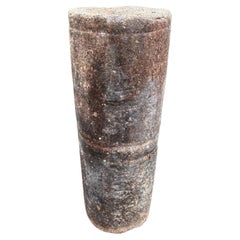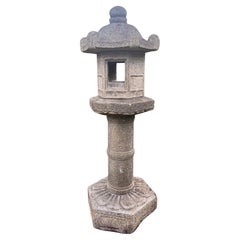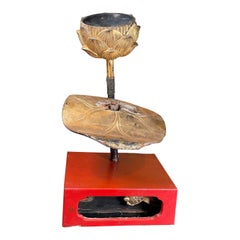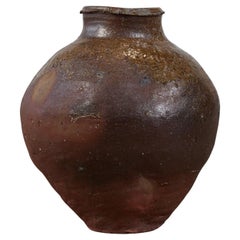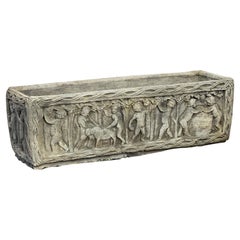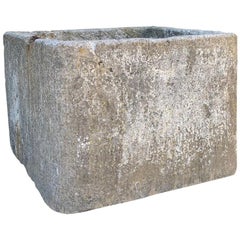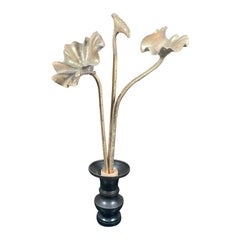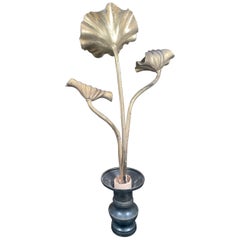Edo Planters and Jardinieres
Edo furniture was created during a flourishing time for the decorative arts owing to the stability of the Tokugawa shogunate rule in Japan. Spanning from 1603 to 1867, this era of peace and economic growth supported artistic advancements in lacquer, woodblock printing, porcelain and other artisanal trades. Because the country was largely isolated, there was little outside influence, leading to centuries of exceptional attention to the design of its furnishings and the quality of its traditional arts.
Unlike during the Meiji period that followed, with an increase in domestic and international markets, furniture during the Edo period was predominately commissioned by the ruling class, although people from across social groups benefited from the burgeoning metropolitan hubs for artisanal trades. For instance, Kyoto became a major center for lacquer art. Most furniture pieces were made from wood such as cedar or ash, including the era’s sashimono cabinets, which involved fine joinery and were rooted in the Heian period.
Sashimono cabinets, which were built by master craftsmen in a range of different wood types owing to the various trees that populate Japan, occasionally featured a stack of slender drawers as well as sliding doors. They were popular with everyone from samurai to kabuki actors. Tansu storage chests crafted from wood with metal fittings were also common in Edo-period homes. Some were designed to be easily portable while others were made to double as staircases.
Painted folding screens, called byōbu, were also fashionable, with Japanese artists inspired by nature, literature and scenes of history and daily life to create vivid works. In Buddhist temples and the palatial homes of the aristocratic class, fusuma, or large sliding panels, would sometimes be adorned with gold or silver leaf. These dividers allowed interiors to change throughout the day, closing in small spaces for personal use or reflecting candlelight to illuminate communal spaces after dark.
Find a collection of Edo tables, lighting, decorative objects, wall decorations and more furniture on 1stDibs.
19th Century Japanese Antique Edo Planters and Jardinieres
Stone
19th Century Japanese Antique Edo Planters and Jardinieres
Stone
1840s Japanese Antique Edo Planters and Jardinieres
Wood, Pine
18th Century Japanese Antique Edo Planters and Jardinieres
Ceramic
20th Century English Edo Planters and Jardinieres
Stone, Cast Stone
Early 19th Century Belgian Antique Edo Planters and Jardinieres
Granite
19th Century French Antique Edo Planters and Jardinieres
Iron
Early 20th Century Chinese Edo Planters and Jardinieres
Limestone
20th Century Edo Planters and Jardinieres
Cement
Early 20th Century Spanish Edo Planters and Jardinieres
Stone
Mid-19th Century Antique Edo Planters and Jardinieres
Stone
19th Century Antique Edo Planters and Jardinieres
Bronze
1950s North American Vintage Edo Planters and Jardinieres
Iron
18th Century Japanese Antique Edo Planters and Jardinieres
Stone, Granite
Mid-20th Century Czech Edo Planters and Jardinieres
Wood, Lacquer
17th Century French Antique Edo Planters and Jardinieres
Stone, Limestone
1840s Japanese Antique Edo Planters and Jardinieres
Wood
1840s Japanese Antique Edo Planters and Jardinieres
Wood
1840s Japanese Antique Edo Planters and Jardinieres
Wood
19th Century Japanese Antique Edo Planters and Jardinieres
Stone
Early 18th Century Japanese Antique Edo Planters and Jardinieres
Bronze, Copper
Mid-19th Century Japanese Antique Edo Planters and Jardinieres
Stone
19th Century Japanese Antique Edo Planters and Jardinieres
Stone
18th Century Japanese Antique Edo Planters and Jardinieres
Granite
18th Century Japanese Antique Edo Planters and Jardinieres
Stone
Late 19th Century British Antique Edo Planters and Jardinieres
Brass, Copper
17th Century Japanese Antique Edo Planters and Jardinieres
Ceramic
